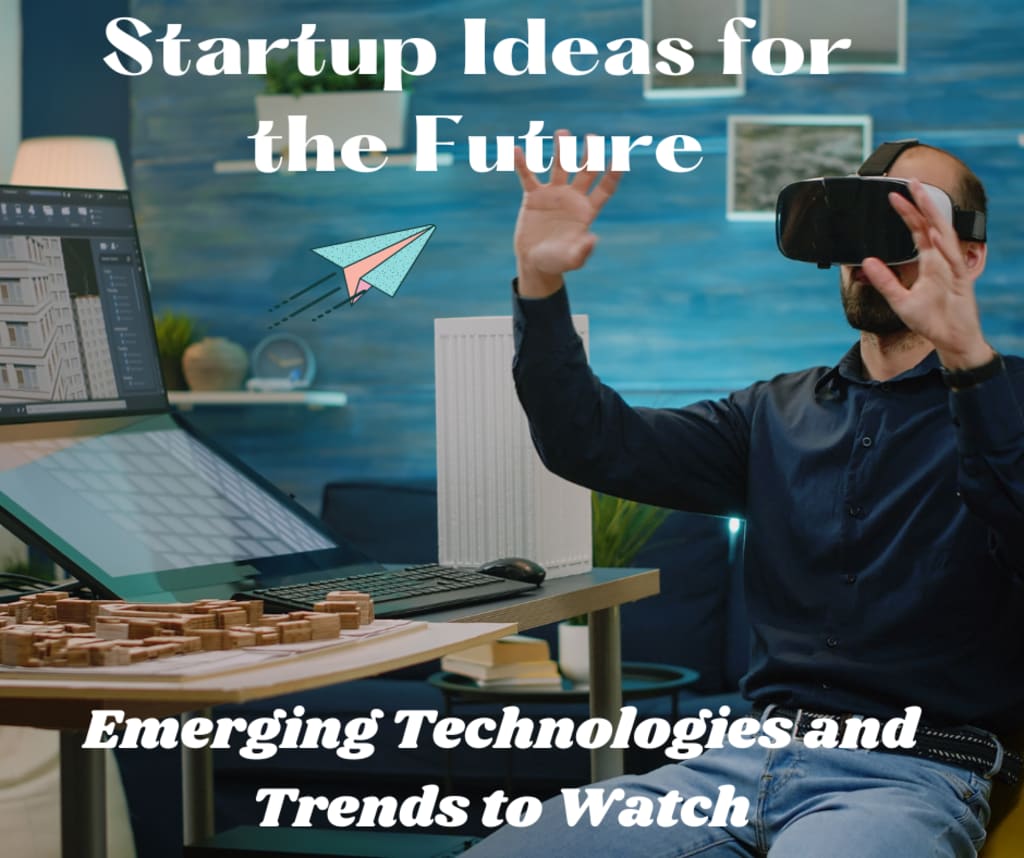Startup Ideas for the Future: Emerging Technologies and Trends to Watch
Exploring the Potential of AI, IoT, Blockchain, AR/VR, and Quantum Computing for Innovative Startups

Introduction
Explanation of startup ideas:
Startups are newly established businesses, typically small in size and looking to offer innovative products, services, or solutions to a specific market. Startup ideas refer to the concepts or plans that entrepreneurs come up with to create such businesses. These ideas are often based on identifying unmet market needs or exploiting emerging opportunities to create value and achieve growth.
Importance of emerging technologies and trends:
Emerging technologies and trends are critical drivers of innovation and economic growth in the modern world. They represent the next wave of disruptive innovations that can reshape entire industries and transform the way we live, work, and interact with one another. For entrepreneurs, keeping up with emerging technologies and trends is essential to identify new opportunities and stay ahead of the competition. Therefore, exploring startup ideas based on emerging technologies and trends can be a promising way to create successful businesses that have a significant impact on society.
Artificial Intelligence (AI) and Machine Learning
Artificial Intelligence (AI) is a branch of computer science that focuses on developing algorithms and systems that can perform tasks that typically require human intelligence, such as language translation, visual perception, and decision-making. Machine Learning (ML) is a subfield of AI that involves training algorithms to learn from data and improve their performance over time without being explicitly programmed. ML algorithms can analyze large amounts of data and discover patterns, trends, and insights that can be used to make predictions or automate tasks.
Potential startup ideas in AI and machine learning:
Natural Language Processing (NLP):
NLP is an AI technology that enables computers to understand, interpret, and generate human language. Startup ideas in NLP could include developing chatbots for customer service, virtual assistants for personal or business use, or speech recognition software for various applications.
Predictive Maintenance:
Predictive maintenance is an AI-powered approach to equipment maintenance that uses sensors and data analytics to predict when maintenance is needed before a breakdown occurs. Startups in this field could focus on developing algorithms and software solutions that can detect and predict equipment failures in different industries, such as manufacturing, energy, or transportation.
Chatbots and Personal Assistants:
Chatbots and personal assistants are becoming increasingly popular as AI-powered tools for communication and task automation. Startup ideas in this area could include creating chatbots for specific industries or tasks, developing personal assistants for individual users or businesses, or building platforms that enable users to build and customize their own chatbots or personal assistants.
Internet of Things (IoT)
Overview of IoT:
The Internet of Things (IoT) refers to the network of physical objects, devices, and sensors that are connected to the internet and can collect and exchange data. These devices can range from everyday items like smart thermostats and appliances to industrial equipment and vehicles. IoT technology enables real-time monitoring, automation, and control of these devices, creating new opportunities for businesses and consumers alike.
Potential startup ideas in IoT:
Smart Homes:
Smart home technology is becoming increasingly popular, and startups in this space could focus on developing innovative products and services that make homes more efficient, secure, and convenient. Potential ideas include developing smart energy management systems, creating intelligent security systems that use IoT sensors to detect intruders or hazards, or building platforms that allow users to control all their smart home devices from a single interface.
Industrial IoT (IIoT):
Industrial IoT (IIoT) refers to the use of IoT technology in industrial settings, such as manufacturing plants or logistics centers. Startups in this space could focus on developing IoT-powered systems that optimize supply chain management, improve equipment maintenance and monitoring, or enhance worker safety and productivity.
Wearable Technology:
Wearable technology refers to IoT devices that are worn on the body, such as smartwatches or fitness trackers. Startups in this space could focus on developing innovative wearable devices that track health and fitness data, improve workplace safety and productivity, or enhance entertainment and gaming experiences. Additionally, startups could focus on creating platforms that enable developers to build new applications and services that leverage wearable technology.
Blockchain
Overview of blockchain:
Blockchain is a distributed ledger technology that allows secure and transparent transactions between multiple parties without the need for intermediaries. Each block in the chain contains a digital record of transactions that cannot be altered without consensus from the network. Blockchain technology offers potential benefits such as increased security, transparency, and efficiency in various sectors.
Potential startup ideas in the blockchain:
Decentralized Finance (DeFi):
Decentralized finance (DeFi) is an emerging field that uses blockchain technology to create financial applications that operate independently of traditional financial intermediaries. Startups in this space could focus on developing DeFi applications such as decentralized exchanges (DEXs), lending platforms, or prediction markets.
Supply Chain Management:
Blockchain technology can provide transparency and traceability throughout the supply chain, from raw materials to the end product. Startups in this space could focus on developing blockchain-powered platforms that enable tracking and verification of products, preventing fraud, and improving efficiency in supply chain management.
Digital Identity:
Blockchain technology can provide a secure and tamper-proof digital identity system that could replace traditional identity verification methods. Startups in this space could focus on developing blockchain-based digital identity systems that provide users with more control over their data and privacy. These systems could also enable secure and efficient identity verification for a range of applications, including financial services, healthcare, and e-commerce.
Augmented Reality (AR) and Virtual Reality (VR)
Overview of AR and VR:
Augmented Reality (AR) and Virtual Reality (VR) are technologies that create immersive experiences by blending digital content with the physical world (AR) or creating a completely simulated environment (VR). AR and VR technology can enhance entertainment, training, education, and healthcare experiences.
Potential startup ideas in AR and VR:
Gaming and Entertainment:
Gaming and entertainment are some of the most popular uses for AR and VR technology. Startups in this space could focus on developing immersive gaming experiences or creating AR/VR content for movies, television, and other forms of entertainment.
Training and Education:
AR and VR technology can provide immersive and interactive training and educational experiences. Startups in this space could focus on developing AR/VR applications that provide training for specific skills or industries, such as manufacturing or healthcare. They could also create immersive educational experiences for schools and universities.
Healthcare and Medicine:
AR and VR technology can provide new opportunities for healthcare and medicine. Startups in this space could focus on developing AR/VR applications that provide immersive experiences for medical training or treatment, such as using AR to visualize anatomy or VR for pain management. They could also create AR/VR platforms for telemedicine or remote patient monitoring.
Quantum Computing
Overview of quantum computing:
Quantum computing is an emerging technology that uses quantum mechanics principles to perform computations. Quantum computers have the potential to solve complex problems that are currently unsolvable by classical computers. Quantum computing relies on quantum bits (qubits) that can exist in multiple states simultaneously, allowing quantum computers to perform computations in parallel, which makes them significantly faster than classical computers.
Potential startup ideas in quantum computing:
Cryptography and Security:
Quantum computing can potentially break traditional cryptography methods used for secure communication and data protection. Startups in this space could focus on developing new quantum-safe encryption methods or quantum-resistant cryptography. They could also develop quantum-based cybersecurity solutions that offer improved security against cyberattacks.
Drug Discovery and Material Science:
Quantum computing can simulate the behavior of atoms and molecules at a much larger scale than classical computers. Startups in this space could focus on developing quantum algorithms and software to accelerate the discovery of new drugs or materials. They could also develop quantum simulation platforms for use in the chemical and material science industries.
Financial Modeling:
Quantum computing can be used to analyze large amounts of financial data and perform complex financial modeling. Startups in this space could focus on developing quantum algorithms for portfolio optimization, risk management, and algorithmic trading. They could also develop quantum-based machine learning models for predicting financial markets and trends.
Conclusion
In conclusion, emerging technologies and trends are shaping the future of various industries and creating new opportunities for startups. Artificial intelligence and machine learning, the Internet of Things, blockchain, augmented and virtual reality, and quantum computing is some of the most promising emerging technologies that startups can leverage to create innovative solutions and disrupt traditional industries. From developing decentralized finance applications to creating immersive educational experiences or quantum-based cybersecurity solutions, the potential for startups to innovate and make a significant impact is vast. As these technologies continue to evolve and become more mainstream, startups that are well-positioned to harness their potential are poised to succeed in the future.
About the Creator
Enjoyed the story? Support the Creator.
Subscribe for free to receive all their stories in your feed. You could also pledge your support or give them a one-off tip, letting them know you appreciate their work.





Comments
There are no comments for this story
Be the first to respond and start the conversation.